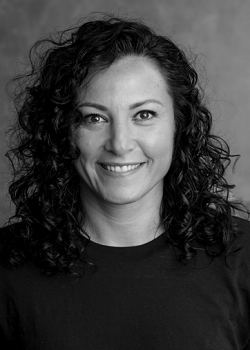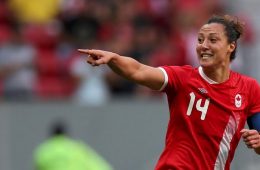Melissa Tancredi, a 3-time Olympian and 2-time bronze medalist during her 15-year soccer career, shares her journey about becoming a doctor of chiropractic medicine and explains what it takes to continue to strive on and off the field while juggling academics to become a health practitioner.

Finding the right program
While completing her undergraduate degree at the University of Notre Dame, Melissa decided to continue her postgraduate journey at Logan University, in St. Louis County, Missouri. Taking pre-med and Anthropology in university helped her fulfill the credits and prerequisites necessary to apply to chiropractic college.
Finding the right fit for her needs while training took time to prioritize.
“I looked at where all the schools were, their background and if they offer a sports-specific program within the program itself,” she says. “I narrowed down schools based on this criteria, and it basically came down to Toronto, St. Louis and Lombard.”
“I think it was a perfect fit, especially with their Sports Performance program, as well as their Master’s in Sports Science program they offered.”
Melissa highly recommends that when it comes to choosing a school, find an institution that wants to help you achieve your goals in the classroom and on the field.
Discovering balance
Once her decision was made, she knew that balancing school and sport would be a challenge. She admits juggling the two was difficult. Whenever she was away with soccer for a prolonged period of time, she maintained consistent study habits, as if she were still in school, planning ahead by taking the initiative to read ahead on her own while she was away on the pitch.
“The hardest part was the other side of things — staying in shape in order to compete at an elite level. It helped that Logan had a beautiful fitness facility and fields on campus as well as a soccer team which I trained with.”
Ultimately, Logan was extremely supportive of Melissa’s goals. Their academic resource staff provided her with patience during her eight-year journey to complete her doctorate. It was never easy for her to balance the many challenges and feats she faced along the way.
“I had some visa mishaps and delays in the past (due to extensive breaks from the program), trying to play and then return as a student. I was away from school for many years and had to come back and complete everything. It was extremely hard to get back into the swing of things and remember a lot of content that I had learned almost two years previously. It was also extremely hard to keep a good balance as I got deeper into my program. With class then clinical rotations, it was a struggle to keep up the physical part of my journey, as the days are long and your workload just keeps piling up.”
Finding a mentor and support system
Whether it’s in sport or in your career, it’s always important to find a mentor to help you navigate your next steps with success. Melissa credits her success in the classroom to support her coaches and professors provided toward her goals. Their belief never fell short, she says: “I think they just knew I was always going to be a hard worker, and I took my studies seriously, so it wasn’t like I was taking advantage of the system by any means.”
Melissa says her assigned guidance counsellor was also instrumental in helping her organize her studies and sporting life. Along the way, her classmates also helped by sharing notes and tips in classes.
Performances on the pitch to private practice
Leaving the pitch is never easy or seamless. However, when you know you want to retire and your career in sport comes to fruition, using your passion and interests to serve others is the perfect recipe for new opportunities and challenges. Melissa describes the steps she took to make her transition go smoothly.
“I made sure I had options. For me, I was looking at Vancouver or Chicago and kept in touch with certain chiropractors there. When I was 100% set on my retirement, I set a start date for my private practice and basically used my personal social media to announce that my doors were open. I was mentally prepared for this transition, as much as I could plan for. I know of other teammates who had used Game Plan to help with their transition, but for me the quick turnover almost made it a turnkey change for me. The hardest part was letting go of training like a crazy person and not feeling guilty that I wasn’t able to train with the same consistency and intensity that I had been used to.”
She recommends considering international accreditation in your decision-making process. She ensured that she kept her options open when it came to board exams by becoming fully accredited in both the United States and Canada and learning about how scopes of practice can differ in various states and provinces.
After taking part in FIFA World Cups and wearing the maple leaf at several Games, Melissa shed light on her emotions when she made her decision to retire.
“The feeling of going from the pitch/training environment to the office grind and working with patients... I definitely miss the field and that structure around my day. I miss competing and the feeling of representing your country and hearing your national anthem play. However, my new life is a new challenge, which I love. Early consistent mornings and long days were hard to get used to, but I love the constant interaction with people, problem-solving with every new patient or session. It’s also a way to share your story and create a connection with new people, which I find so intriguing. So yes, I’ll never get that rush of playing in front of a sold-out crowd on the world stage, but I do still get a strong sense of excitement showing up to work knowing that I could affect someone’s life in a positive way. I could help improve the quality of life of another person. That is also an incredible feeling that tends to get just as addicting as the feeling of competing.”
Ultimately, her career choice has provided the perfect way to incorporate the mentality and life skills of a professional athlete into a job. Having first-hand knowledge of the body, its function and injuries provides a simple connection back to her career in sport and provides her private practice with a competitive advantage.
“People tend to gravitate towards practitioners who have a background in sports, someone who understands what they’re going through and feeling, and also someone who understands the importance of getting back on the field,” she says.
Melissa’s gratitude for her experiences and achievements in sport has created a positive impact within her community and in her practice.
For more information on how you can start your journey in sports chiropractic, check out the Game Plan Education Network and available scholarships.

